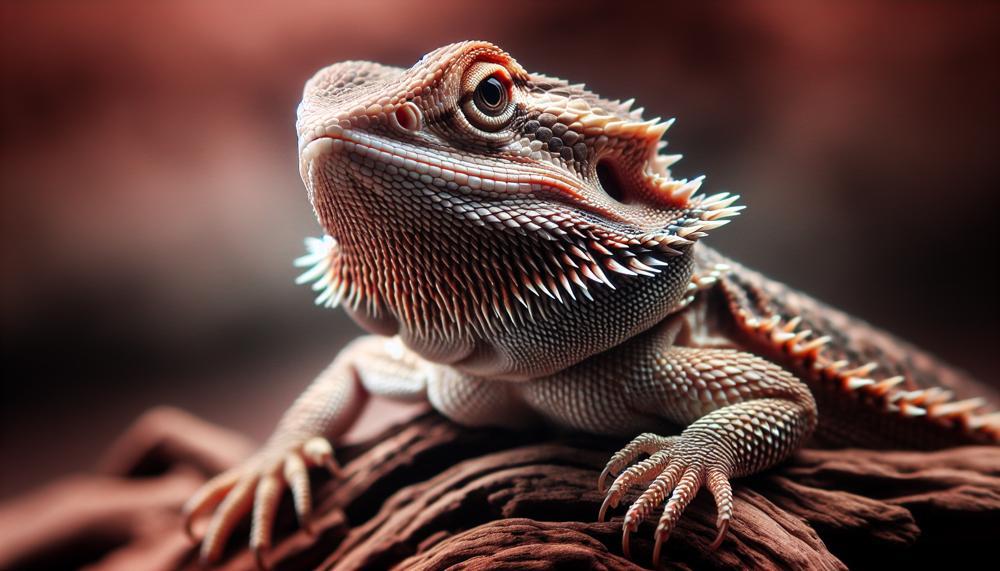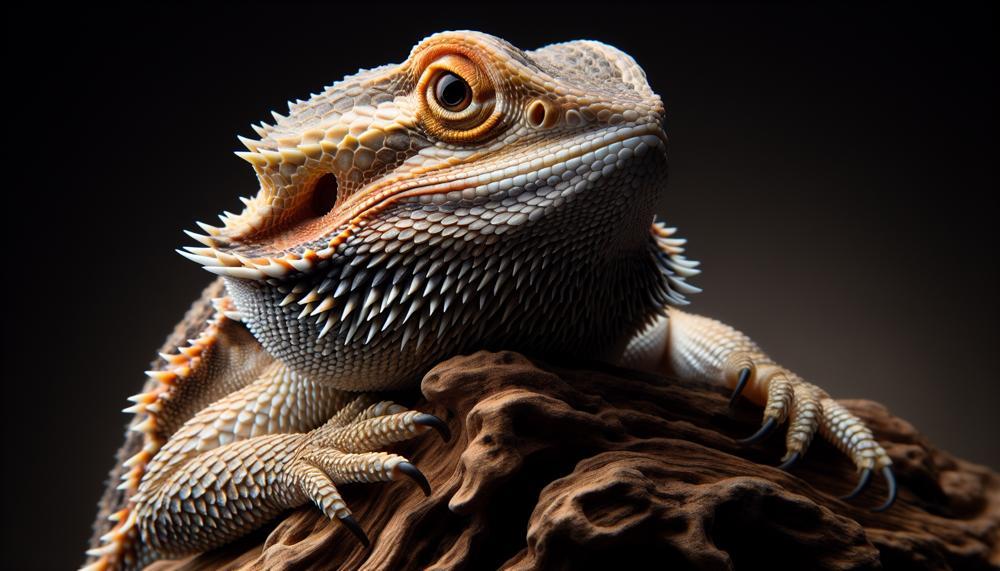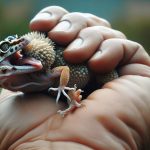Are you thinking of welcoming a bearded dragon into your family of furry or scaly friends? Or perhaps you already have one and want to ensure they live a long and healthy life? We delve into the captivating world of these unique reptiles. We explore their lifespan.
From the average length of their existence to the factors that can impact it, we’ve got you covered.
In this blog post, we’ll cover:
- The typical lifespan of a bearded dragon
- Factors that can influence their longevity
- Signs of aging in these majestic creatures
- Tips for promoting a thriving and extended life for your pet
- Common misconceptions about how long they live
Prepare to become well-versed in all aspects of bearded dragons’ lifespan. Let’s begin.
Contents
- 1 How Long Do Bearded Dragons Live In Captivity?
- 2 How Long Do Bearded Dragons Live In The Wild?
- 3 Why Don’t Bearded Dragons Live As Long In The Wild?
- 4 What Is The Oldest Bearded Dragon Ever Recorded?
- 5 How Long Do Captive Bearded Dragons Live Compared to Other Lizards?
- 6 Do All Captive Bearded Dragons Live Long Lives With Good Care?
- 7 What Factors Can Affect The Lifespan Of a Captive Bearded Dragon?
- 8 How Can I Tell How Old My Bearded Dragon Is?
- 9 Can Bearded Dragons Swim? (The Surprising Truth)
- 10 Conclusion
How Long Do Bearded Dragons Live In Captivity?
In captivity, bearded dragons live 8 to 12 years. Some individuals live up to 15 years with proper care and genetics. Yet, lifespan can vary. Factors like diet, environmental conditions, and genetics can affect it.
Diet plays a crucial role in the health and longevity of bearded dragons. A well-balanced and nutritious diet is essential for their overall well-being. It is important to provide a variety of food options. For example, insects, vegetables, and fruits ensure they receive all the necessary nutrients.
In addition to a proper diet, maintaining optimal environmental conditions is vital for bearded dragons. These reptiles require specific temperatures and humidity levels to thrive. Poor conditions can lead to various health problems and ultimately shorten their lifespan.
Genetics also play a significant role in the lifespan of bearded dragons. Some individuals may have genetic predispositions to certain health conditions. These conditions can affect their longevity. Therefore, it is crucial to research the source of your bearded dragon. Ensure you are getting a healthy individual.
How Long Do Bearded Dragons Live In The Wild?
Bearded dragons have a shorter lifespan than those living in captivity. Typically, they only live 6 to 8 years.
This is due to several factors. Predators, harsh weather, and limited access to proper care and nutrition all play a part.
Factors Influencing Lifespan:
While the average lifespan of a bearded dragon in its natural habitat is only 6 to 8 years, there are several factors that can impact their longevity.
These factors include:
- Predators: Bearded dragons are prey animals, making them vulnerable to attacks from predators such as birds of prey, snakes, and larger lizards. In the wild, they must constantly be on guard and use their natural defense mechanisms to survive.
- Harsh Weather Conditions: Native to Australia, bearded dragons are exposed to extreme temperatures and weather conditions. In the wild, they must adapt and withstand these harsh conditions without the comfort of a temperature-controlled enclosure.
- Limited Access to Proper Care and Nutrition: In captivity, bearded dragons receive proper care and nutrition from their owners. However, in the wild, they must fend for themselves and may not always have access to a well-balanced diet and necessary supplements.
Why Don’t Bearded Dragons Live As Long In The Wild?
The lifespan of bearded dragons, a relatively long-lived reptile, varies greatly between those in the wild and those kept as pets. In the wild, numerous factors contribute to their shorter lifespan. These include natural predators, access to proper care and nutrition, and environmental conditions.
Predators
In their natural habitat, bearded dragons face a constant threat from predators. These include dingoes, birds of prey, and large lizards. These predators can easily capture and kill bearded dragons. This is particularly true for young ones who have not yet developed their natural defense mechanisms.
However, in captivity, these reptiles are protected from dangers. They are at a lower risk of facing threats.
The average lifespan of a wild bearded dragon is only 5-8 years. Those kept in captivity can live up to 8-15 years. This significant difference is due in part to the quality of care provided. It’s also due to access to proper nutrition.
If you buy a bearded dragon from a reputable breeder who breeds healthy and genetically diverse dragons, it is more likely to live longer.
Extreme Weather Conditions
Bearded dragons in the wild also face extreme weather conditions that can greatly impact their health and lifespan. Harsh temperatures, whether too hot or too cold, can be detrimental to their well-being. This is especially true for younger or weaker individuals.
In captivity, owners can control the temperature and humidity levels in their beardie’s habitat. This provides the lizards with a more suitable environment to thrive.
Proper Nutrition
Proper nutrition is crucial for maximizing a beardie’s lifespan. In their natural habitat, they primarily feed on insects, small mammals, and vegetation. However, in captivity, they require a well-rounded diet that includes both animal-based protein and plant-based foods.
Younger bearded dragons need more protein in their diet while adults require more vegetables and greens.
Other Factors
Other factors that can affect a beardie’s lifespan include the setup of their habitat. This includes regular veterinary check-ups and breeding. Maintaining a healthy beardie requires a healthy and appropriate habitat. Proper lighting, temperature, humidity levels, and substrate are essential.
Regular veterinary check-ups can help detect any health issues early on and prevent them from becoming life-threatening. Breeding can also take a toll on female beardies’ bodies. Multiple clutches can shorten their lifespan.
What Is The Oldest Bearded Dragon Ever Recorded?
The average lifespan of a bearded dragon is typically between 6 and 8 years when living in the wild. However, when kept in captivity, they can exceed this range and live up to 10 years. Some individuals even live beyond 12 years. The oldest recorded age for a bearded dragon is an astounding 18 years.
The longest-lived recorded bearded dragon was named ‘Sebastian.’ He lived to be an incredible 18 years old. He was owned by the National Bearded Dragon Society in the United Kingdom. His remarkable age was a result of his owner’s unwavering dedication to providing him with the best care possible.
How Long Do Captive Bearded Dragons Live Compared to Other Lizards?
Bearded dragons have a longer lifespan of 10 to 12 years in captivity, compared to other commonly kept lizard species. This is due to various factors such as their natural habitat, dietary needs, and hardiness.

| Species | Average Lifespan in Captivity | Natural Habitat | Dietary Needs |
| Bearded Dragon | 10-12 years | The Australian Outback | Omnivorous |
| Leopard Gecko | 8-10 years | Middle East and Asia | Insectivorous |
| Green Iguana | 8-10 years | Central and South America | Herbivorous |
| Chameleon | 3-5 years | Tropical regions worldwide | Insectivorous/Herbivorous |
As shown in the table above, bearded dragons have a longer lifespan than other commonly kept lizard species. Bearded dragons can live 15 years or more in their natural habitat. This makes them one of the longest living lizard species.
This can be attributed to their harsh environment in the Australian outback. It has forced them to build a strong immune system.
Do All Captive Bearded Dragons Live Long Lives With Good Care?
Various factors influence the lifespan of captive bearded dragons. These factors include their diet, habitat, veterinary care, socialization, and stress management.
By ensuring proper care in these areas, you can extend their life expectancy and promote their overall well-being.
Diet:
A healthy and balanced diet plays a crucial role in the longevity of captive bearded dragons. In their natural habitat, they primarily consume insects and vegetation, and this should be replicated in captivity.
A diverse diet of crickets, roaches, mealworms, and vegetables like collard greens, squash, and carrots will provide them with essential nutrients. You may also give them commercial diets and supplements to ensure they receive all the necessary vitamins and minerals.
Habitat:
Creating a suitable habitat for your bearded dragon is vital for their health and lifespan. This includes maintaining proper temperature control, humidity levels, lighting, and substrate. Bearded dragons require a basking spot with a temperature of 95-100 degrees Fahrenheit. They also need a cooler area around 80 degrees Fahrenheit.
Providing a UVB light is also necessary for them to absorb calcium for strong bones. The substrate should be easy to clean and pose no health risks.
Veterinary Care:
Regular check-ups with a veterinarian who specializes in reptiles can help detect any health issues early on and ensure your bearded dragon receives proper care. Vaccinations may also be necessary to protect them from common reptile diseases.
Additionally, maintaining good hygiene in their habitat can prevent the spread of bacteria and parasites.
Socialization:
Bearded dragons are sociable creatures that thrive on interaction with their owners.
Regular handling and playtime can reduce stress levels and keep them mentally stimulated. It’s also an excellent way to detect any changes in behavior or health early on.
Stress Management:
Stress can significantly impact the health and lifespan of captive bearded dragons.
Providing a comfortable and stimulating environment can help reduce stress levels. Regular handling also helps.
To prevent stress-related health issues, avoid overcrowding, sudden changes in their habitat, and excessive handling.
What Factors Can Affect The Lifespan Of a Captive Bearded Dragon?
The lifespan of a captive bearded dragon can be affected by various key factors. These factors include diet, nutrition, environment, habitat, genetics, stress management, veterinary care, and age, and gender.
- Firstly, diet and nutrition play a crucial role in the health and longevity of a bearded dragon. A balanced diet consisting of a variety of insects, leafy greens, and vegetables is necessary to provide the necessary nutrients for their well-being.
- In addition to diet, the environment and habitat of a bearded dragon also have a significant impact on their lifespan. It is important to create an enclosure that mimics their natural habitat. This includes proper lighting, heating, substrate, and hiding places.
- Genetics can also play a role in a bearded dragon’s lifespan. Some genetic factors may make them more prone to certain health conditions, highlighting the importance of researching the lineage of a bearded dragon before purchasing one.
- Stress management is another crucial factor to consider. Bearded dragons are solitary creatures in the wild. They may become stressed if housed with other bearded dragons or handled too frequently. This stress can weaken their immune system, making them more susceptible to diseases and infections.
- Regular visits to a reptile veterinarian are essential for maintaining the health of a bearded dragon. Annual check-ups can help detect any health issues early on and prevent them from developing into more severe conditions.
- Lastly, age and gender can also impact the lifespan of a bearded dragon. Female bearded dragons tend to live longer than males, while younger dragons have a longer life expectancy compared to older ones.
How Can I Tell How Old My Bearded Dragon Is?
You can determine a bearded dragon’s age in four main ways. Measure its size and look for signs of sexual maturity. Then, contact the breeder and consult with a veterinarian.
Each method offers valuable insights into your dragon’s age. It helps you ensure their well-being.
Measure Size and Compare to Growth Chart:
One method to estimate your bearded dragon’s age is by measuring its size and comparing it to a growth chart. Bearded dragons grow rapidly in their first year, with some reaching up to 18 inches in length.
By comparing their size to a growth chart, you can get a general idea of their age. However, this method may not be entirely accurate as genetics and diet can also play a role in their size.
Look for Signs of Sexual Maturity:
Bearded dragons typically reach sexual maturity between 8 months to 1 year old. As they mature, male dragons develop larger femoral pores on their hind legs and a more prominent hemipenal bulge under their tails.
Females may also have bulges under their tails, but they are less noticeable than those in males. You can determine if your dragon has reached sexual maturity and roughly how old they are by observing these physical characteristics.
Contact the Breeder for Official Papers:
If you purchased your bearded dragon from a breeder, they may have official papers stating their age. This information can be helpful in accurately determining your dragon’s age.
However, if you adopted your dragon from a rescue or pet store, this information may not be available.
Consult with a Veterinarian:
Another way to determine your bearded dragon’s age is by consulting with a veterinarian. A veterinarian who specializes in reptiles can help. They can examine and provide an estimate based on their expertise.
They may also identify potential health issues. This could give insight into your dragon’s age.
Can Bearded Dragons Swim? (The Surprising Truth)
Yes, bearded dragons can swim. They can hold their breath for up to two minutes. To swim, they inhale air to float and use their limbs to paddle through the water. They can also puff their bodies up like a balloon to float and use their long tails to swim relatively fast.
Bearded dragons can swim. However, you should not raise the water level. There’s always the risk of drowning. Some recommend slowly letting the dragons into the water.
Conclusion
In conclusion, the lifespan of a bearded dragon can vary from 8 to 12 years in captivity. It depends on proper care and genetics.
A balanced and nutritious diet, optimal environmental conditions, and good genetics all contribute to a longer and healthier life for these fascinating reptiles. Bearded dragons may have a shorter lifespan in the wild. This is due to predators, harsh weather, and limited access to care and nutrition. However, they are still able to adapt and survive in their natural habitat.
However, with proper care and precautions taken in captivity, bearded dragons can live longer than their wild counterparts. Even with the best care possible, bearded dragons may develop health issues. These issues can affect their lifespan.






